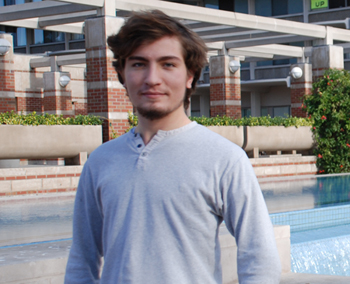
Alessandro Marazzi Sassoon
Former indexer Alessandro Marazzi Sassoon may have left his job at the USC Shoah Foundation last year, but what he learned working with the Institute has had a lasting impact.
Sassoon is now halfway through his year-long fellowship with Princeton in Asia, a nonprofit organization that helps recent graduate obtain short-term positions on the continent. In addition to his role as an indexer for USC Shoah Foundation, Sassoon, who graduated from USC in 2014 with a degree in international relations, also worked as an intern and went on the Institute’s Problems Without Passports study abroad trip to Rwanda. Now, Sassoon is stationed in Phnom Penh, Cambodia, where he is covering the Khmer Rouge Tribunal for the Phnom Penh Post.
“The chance to work at an award-winning newspaper was impossible to pass up given that I had wanted to try out being a reporter and am always looking for international experiences,” Sassoon said of his decision to pursue the opportunity.
The Khmer Rouge Tribunal, also known as the Extraordinary Chambers in the Courts of Cambodia (ECCC), is a court that puts former top-level Khmer Rouge regime officials on trial for violations of law committed during the Cambodian genocide. Up to 3 million people died during the genocide, which occurred under the rule of dictator Pol Pot from 1975-1979.
“USC Shoah Foundation helped shape the framework of thought that I approach genocide with,” Sassoon said. “Working as an indexer for the short while before I left for my job at the Post was good preparation for covering the Khmer Rouge Tribunal. When you have witnesses delivering five hours of court testimony each day, it really helps to have your bases covered in terms of terminology to be able to then synthesize that information into about 400 words in a way that is compelling to read yet captures the essence of what happened in court.”
Though working as a journalist and covering live proceedings is very different in many ways from what Sassoon did while at USC Shoah Foundation, there is overlap between the two. For one, both involve documenting past genocides in some manner.
“‘The pursuit of the truth’ is a key principle for the ECCC, whether they do that is a separate question, but there’s definitely a lot that is still not publicly known about what happened and why it happened,” he said. “For that reason alone, the limited historical record the ECCC is creating has objective value.”
In addition to the general knowledge about genocide that working with the Institute gave him, Sassoon also learned about using video testimony and recordings, something he continues to put to work as a reporter.
“The ECCC keeps a video archive of all the public court hearings (there are closed sessions for confidentiality reasons), but there’s absolutely no way for anyone to reasonably search it if they were looking for testimony that covered a specific episode,” he said. “In that sense, the work of Tribunal reporters and ‘monitors’ that write up court reports is a form of indexing; you can read that to know what any given day of Tribunal testimony consisted of.”
Though Sassoon said he doesn’t know yet where he’ll end up after his fellowship is over, he may continue down a similar path to the one he’s on now.
“Journalism really has captured my imagination simply because it's constantly exposing me to new things,” he said.